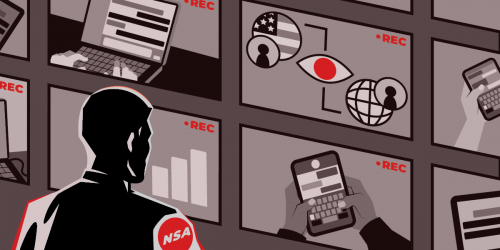Senate Majority Leader Mitch McConnell has made it clear this week that, while the Senate is rapidly approaching recess, the Senate “will stay in [session] until a deal is struck to extend” the Patriot Act. McConnell has also introduced legislation for both long-term and short-term reauthorization of the Patriot Act’s expiring provisions. It seems that McConnell is trying to bully the entire Senate into passing short-term reauthorization, giving him more time to further weaken reform efforts. A look at McConnell’s history makes this unblinking support of unconstitutional surveillance less surprising. But what is impressive is his commitment to supporting untenable positions. He acts as if the Snowden leaks, which helped expose just how out of control NSA spying is, as well as the recent Second Circuit decision holding that the NSA’s telephone records program was unlawful, never happened.
A look at McConnell’s history makes this unblinking support of unconstitutional surveillance less surprising. But what is impressive is his commitment to supporting untenable positions. He acts as if the Snowden leaks, which helped expose just how out of control NSA spying is, as well as the recent Second Circuit decision holding that the NSA’s telephone records program was unlawful, never happened.
This was especially apparent today, when McConnell stood on the Senate floor and rattled off a litany of the exaggerated threats that NSA defenders have been relying on to scare Americans into submission: ISIL, Al Qaeda, Al Shabaab, safe havens in Syria for extremists, and safehouses in Yemen for terrorists. He wrapped it up with an all time greatest hits of NSA defenders, explaining why he thinks we need bulk collection (more on that below).
So what was McConnell saying pre-Snowden? An op-ed he wrote in support of Patriot Act reauthorization in 2007 shows that he hasn’t changed his tune at all in eight years. In fact, he practically could have been reading sections of the article as he stood on the Senate floor today to defend NSA spying. And earlier this month, he said, “This has been a very important part of our effort to defend the homeland since 9/11.” In 2011, after President Obama signed the most recent Patriot Act extension, he claimed that the Patriot Act has “ kept us safe for nearly a decade and Americans today should be relieved and reassured to know that these programs will continue.” That’s been his position all along, without regard to the what the rest of Americans (or the world, for that matter) think, after all they’ve learned about NSA overreach .
Here’s why, in his own words (which apparently are evergreen, no matter how much we find out about NSA spying abuses), McConnell is clearly the wrong person to be calling the shots when it comes to NSA reform:
McConnell: Intelligence officials tell us the Patriot Act is as valuable today as the day it was signed. They have given us real-world examples of its positive impact in discovering and disrupting terrorist plots overseas and at home.
While intelligence officials have certainly maintained that surveillance under the Patriot Act is valuable, we (and Mitch McConnell) know those claims are overblown, and sometimes simply false. Although surveillance under the Patriot Act has been shrouded in secrecy, because of Snowden’s leaks, claims about the efficacy of these programs have come under scrutiny. The specific contention that “54 attacks have been stopped” by bulk phone records collection has been thoroughly debunked. In fact, Sen. Patrick Leahy forced former NSA director Keith Alexander to admit that the “54 attacks” claim was inaccurate in front of Congress.
Independent studies from the President’s Review Group, the Privacy and Civil Liberties Oversight Board, and the New America Foundation have all made it clear: we don’t need bulk phone records collection.
McConnell: After all, the best piece of evidence is the one that is most obvious and most important: not a single successful attack on U.S. soil since the morning we awoke to the danger and acted on it in our laws.
While this may have been accurate in 2007, it is, unfortunately, not true now. The Boston Marathon bombing was a tragic example of a terrorist attack on U.S. soil. After the attack, there were questions about whether the FBI could have done more, but the FBI made it clear that there was nothing else it could have done. And while some have claimed that’s because of the legal limits on what the FBI can do (more on that below), Rep. Jim Sensenbrenner very sensibly pointed out that mass records collection can actually be detrimental: “It didn't stop the Boston Marathon Massacre. Sometimes too much information means that what you are looking for is actually a very small needle in a very large hay stack. You can be drowned in too much information.”
And while the Boston Marathon bombing got a justifiably significant amount of media attention, there’s also an epidemic of domestic terrorism against American Muslims that’s getting little attention. In particular, the arson of mosques has become more and more widespread. This kind of terrorism isn't what Section 215 of the Patriot Act was aimed at addressing. But domestic terrorism was a significant focus of other provisions of the law. Yet these crimes are never talked about in the same breath as the Patriot Act—and that’s not only because terrorism against Muslims is low on the media and government’s list of concerns. It’s also because hate crimes against Muslims have dramatically increased since the passage of the Patriot Act, not decreased. There’s no official government estimate of how many of these qualify as terrorism. But under the definition from Section 802 of the Patriot Act itself, nearly any hate crime would qualify.[1] This epidemic of terrorism simply doesn’t fit into the contrived narrative of why we need the Patriot Act. But since these are terrorist attacks against Americans, McConnell might want to focus on this blatant homeland security failure, instead of trying to reauthorize a program of limited usefulness.
McConnell: [The provisions in the Patriot Act] removed bureaucratic barriers that had kept intelligence officials and criminal investigators from sharing information, a simple but major shift that FBI director Robert Mueller has credited with "significantly alter[ing] the landscape for conducting terrorism investigations.”
The oft-repeated claim that had the Patriot Act been in place before 9/11, the NSA would have been able to stop the attack is simply false. According to a 2004 report from the 9/11 Commission, authored by Senior Counsel Barbara Grewe, which the government did not declassify until five years after it was written:
The information sharing failures in the summer of 2001 were not the result of legal barriers but of the failure of individuals to understand that the barriers did not apply to the facts at hand. Simply put, there was no legal reason why the information could not have been shared.
These problems still persist. According to the Government Accountability Office website, as of 2015 “The sharing of terrorism-related information has been designated as high risk [for fraud, waste, and abuse, or mismanagement] because the government faces formidable challenges in analyzing and disseminating this information in a timely, accurate, and useful manner.”
McConnell:Indeed, alarmist concerns notwithstanding, the Patriot Act is one of the most important and overdue pieces of legislation in a generation. My guess is that most Americans were more alarmed to discover that arcane laws once hobbled intelligence agents from tracing terrorist phone calls than they are by the streamlined practice of it now.
McConnell was certainly right when he said the Patriot Act is one of the most important pieces of legislation in a generation. But that’s not because of the reasons he may have thought. It’s one of the most important pieces of legislation in a generation because it is under the guise of the Patriot Act that the NSA has committed some of the most blatantly unconstitutional surveillance this country has ever grappled with.
And he’s also wrong about how Americans feel about surveillance. A recent study by Global Strategy Group (commissioned by ACLU) found:
By nearly a 2:1 margin (60% modify, 34% preserve), Americans believe the Patriot Act should not be reauthorized in its current form. With broad, bipartisan support across all ages, ideologies and political parties, voters are rejecting the argument that the Patriot Act should be preserved with no changes because of potential terrorist threats.
What’s more, the 2004 Grewe report made it clear that it was actually a severe lack of understanding of what McConnell is calling “arcane laws,”—in particular Foreign Intelligence Surveillance Act [FISA]—that led to intelligence failures. Agents missed information-sharing opportunities because of an “overabundance of caution” on the sharing of information by the NSA, as well as a failure to use all the tools available. For instance, the FBI knew it had reason to be concerned about would-be 9/11 hijacker Zacarias Moussaoui. But because they had considered starting an investigation that might require a FISA warrant, when it came to using a criminal warrant to get the information they needed “they just did not think about that option at the time.”
When it came to sharing information about the movements of hijacker Khalid al-Mihdhar, the report explains: “everyone was confused about the rules governing the sharing and use of information gathered in intelligence channels.” What’s more, in the years, months, and days before 9/11, the NSA already had access to a massive database of Americans’ call records. Analysts—at NSA or CIA—could have easily searched the database for calls made from the U.S. to the safehouse in Yemen. They simply didn't.
What should be most alarming to Americans is the level of incompetence that these failures, which could have possibly prevented the tragedy of 9/11, demonstrate. Yet these same intelligence agencies continue to conduct invasive, overbroad surveillance and ask for ever more authority—without ever really addressing the problems that led to their massive failure in 2001.
McConnell: If there is one lesson from Sept. 11 that we should have learned by now, it is that the people who protect us from terrorism should have more, not fewer, tools to do their jobs. The Patriot Act and FISA are among the most valuable. It is time we acknowledged as much.
Senator McConnell’s bald-faced use of the tragedy of 9/11 as an excuse for surveillance programs that trample on the Constitution is as repugnant now as it was then. EFF has always thought that bulk collection was unconstitutional—that’s why we’ve been suing the NSA since 2008, years before the first Snowden leak. And now, unlike then, the truth has been very clearly demonstrated. Of course, it’s not because the government decided to come clean. We know the truth because of those leaks and because of all the transparency work being done by privacy advocates. Quality over quantity must be the rule for surveillance tools. The people who protect us from terrorism should have tools that actually work, while maintaining the privacy and civil rights of all Americans. If you agree, call Congress now and let them know.
[1] "Domestic terrorism" means activities with the following three characteristics:
- Involve acts dangerous to human life that violate federal or state law;
- Appear intended (i) to intimidate or coerce a civilian population; (ii) to influence the policy of a government by intimidation or coercion; or (iii) to affect the conduct of a government by mass destruction, assassination. or kidnapping; and
- Occur primarily within the territorial jurisdiction of the U.S.







